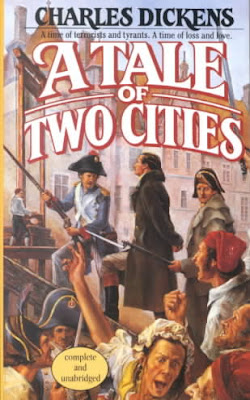
Charles Dickens wrote it 150 years ago. "It was the best of times, it was the worst of times." It must have seemed true when he said it, just as it has often seemed true throughout the course of our lives. Why? The answer must relate to the glass half empty/half full conundrum. Which isn't really so much a conundrum as it is a metaphor about the power of perspective.
In any given moment, we see terrible possibilities for mankind and with good reason. These "glass half empty" thoughts lend powerful support to the notion that it is truly the worst of times. But then something inevitably happens to reinforce the opposite point of view. Whenever I hear Louis Armstrong's "It's A Wonderful World", for example, or "Imagine", my mental state transforms. Instantly, I am full of hope, a veritable fountain of good will. Welcome to the best of times.
Perhaps it is because we only experience life in the present. There is a drama queen within us all, and the average inner drama queen wants to make you think about the worst and best of all possibilities all the time. Actually, I think there are two inner drama queens within us, and they engage in a constant battle with one another. The good DQ wants you to think these are damn sure the very very best of times while the bad DQ wants to freak you out with worry.
The other day, my stepson encountered a man carrying a sign which read "THE END IS NEAR!" He asked the man a profound question: "And why does that bother you so much?" Which proves that one man's worst of times can be another's best of times---it's all a matter of perspective.
"A Tale of Two Cities" was released by Charles Dickens in 37 weekly installments in 1859. The final installment was released on November 25, 1859 which is nearly 150 years ago today. According to one source, 200 million copies were sold in English, more than any other book printed in the English language.
The opening line is so memorable and has been repeated with such frequency that many forget the equally good lines which follow.
"It was the best of times, it was the worst of times; it was the age of wisdom, it was the age of foolishness; it was the epoch of belief, it was the epoch of incredulity; it was the season of Light, it was the season of Darkness; it was the spring of hope, it was the winter of despair; we had everything before us, we had nothing before us; we were all going directly to Heaven, we were all going the other way."
I imagine that during World War II, it must have felt like the worst of times. And when the war ended, it must have felt like the best of times. During the Bush administration, it seemed like the worst of times and yet, I had some of my best life experiences during those eight years. We should accept that it is neither the worst nor best of times at any given moment. That perspective seems, to me, as both a healthy and truthful outlook. It calls upon us to reflect upon history more carefully, always a good thing. It requires us to identify the many positive, helpful things and people we are surrounded by that we often take for granted.
Thank you Mr. Dickens. You continue to enlighten us, long after your departure. Such is the power of words well chosen and ideas well articulated.


No comments:
Post a Comment